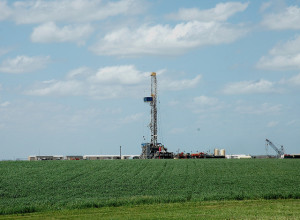Question: Does an oil and gas company who is drilling on ranch land have an obligation to put up a fence around the well to prevent livestock from being injured?
Answer: Believe it or not, the answer is no. Texas law is clear that an oil and gas company is under no legal obligation to fence around operations areas to protect a surface owner’s livestock. This can (and should) be changed by terms in an oil and gas lease or surface use agreement.
First, let’s consider the applicable Texas law. In Texas, the mineral estate is dominate to the surface estate, meaning that a mineral owner or lessee has the implied right to use as much of the surface as is reasonably necessary to produce the minerals, without permission from or payment to the surface owner. “In the absence of a lease provision to the contrary, the only duty owed by the operator of an oil lease to the owner or lessee of the surface, who is pasturing cattle, is not to injure such cattle intentionally, willfully, or wantonly. There is no duty on the part of an operator to put fences around his operations.” Santana Oil Co. v. Henderson, 855 S.W.2d 888 (Tex. App. – El Paso 1993).
Next, let’s take a look at several Texas cases addressing this issue:
- The Texas Supreme Court also sided with the mineral lessee in Warren Petroleum Corp v. Martin, 271 S.W.2d 410 (Tex. 1954). Again, a rancher brought suit after cattle consumed crude oil that escaped from the well and made pools on the ground near the wellhead. The court reasoned there was no evidence of negligence because the rancher did not show that the equipment was defective. The mere fact that oil escaped from the well was not, alone, enough to prove negligence on the part of the operator. Further, because the pools were found near the well–about 5 feet away–there was no evidence that the operator used more of the surface than was reasonably necessary. The Court found in favor of the operator.
- Amerada Hess Corp v. Iparrea, 495 S.W.2d 60 (Tex Ct. App. – El Paso 1973) involved a case where the ranchers sheep consumed oil that escaped from the operator’s well, killing over 800 of them. The Court of Appeals reversed a jury verdict in favor of the rancher. Oil escaped from the well onto the ground by a needle valve that as designed to gauge pressure. The valve was closed when employees left at 7 pm one evening, but was found open the next morning. There was no evidence that the valve was broken or otherwise inoperable and no evidence that including a plug on the valve to prevent oil from leaking was custom in the industry. Further, the operator had no duty to fence off the well in order to protect livestock.
- In Satana Oil Co. v. Henderson, 855 S.W.2d 888 (Tex. App. – El Paso 1993), an Ector County rancher filed suit against mineral lessee, Santana Oil Company, when one of his cows died after ingesting oil from a slush pit. Henderson filed suit alleging that the oil and gas company made unreasonable use of the surface. Because Henderson did not allege that Santana intentionally injured the cattle, and because slush pits are used in the production of oil and, therefore are not unreasonable, Henderson could not recover.
In conclusion, there are essentially only three potential legal claims for a cattle rancher to make in these situations: (1) the operator acted in an intentional, willful, or wanton manner to injure the livestock; (2) the operator acted negligently in producing the minerals; or (3) the operator used more of the surface than was reasonably necessary. Each of these claims will likely be very difficult for a rancher to win. Instead, a rancher is much better off to include contractual provisions that require the operator to fence off operations to protect livestock. Ideally, these provisions should be included in the oil and gas lease itself. If that is not a possibility (usually because the lease was already executed or the rancher does not own any mineral rights), a landowner should seek a surface use agreement.












